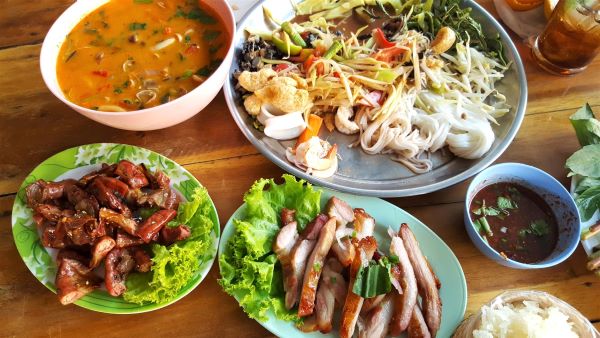
Are you wondering what a Muay Thai diet looks like? Or more specifically what Mauy Thai fighters eat?
In this article, we’ll examine the Muay Thai diet in full and look at what Muay Thai fighters eat. We’ll also examine how the Muay Thai diet changes throughout the year depending on the different phases of fighting. This includes the off-season, weight cutting, fight camp, fight week, post-weigh-ins, and fight day.
Contents
Muay Thai Diet
A Muay Thai diet has the sole purpose of providing optimum nutrition and energy for a Muay Thai fighter’s priority of training. If a Muay Thai fighter performs optimally in training, the desired results in the ring follow.
To make this happen, a Muay Thai diet needs to have variety and be filling, nutritious, balanced, energizing, and enjoyable so a Muay Thai fighter can stick to it consistently.
If a great Muay Thai diet is achieved, a fighter will make weight and still maintain strength, power, energy, and cardiovascular endurance.
Each meal in a Muay Thai diet should have a good balance between carbohydrates, protein, and fats to make sure they’re getting adequate levels of each macronutrient to fuel the body with everything it needs to perform during training and competing.
If one macronutrient is restricted, this deficiency means they won’t be able to train optimally. Nearly every meal in a Muay Thai diet should also have vegetables and/or fruit as these provide minerals, vitamins, and fiber, which keep a fighter full and provide necessary nutrition.
The most important macronutrient in a Muay Thai diet is carbohydrates, much the same as an MMA diet or combat sports diet.
This is because Muay Thai workouts are highly glycolytic, meaning they rely on carbohydrates to most efficiently fuel activity. A high amount of carbohydrates keep blood sugar levels and glycogen levels high which are essential for optimal performance.
The percentage of carbohydrates a Muay Thai fighter eats is determined by their current position and future goals, such as whether they have an upcoming fight and need to cut weight, or they have time away from fighting and are focused on building muscle and training as hard as possible.
This is because their calorie requirements will be different and carbohydrates are the easiest to adjust higher or lower, while protein and fats stay fairly consistent no matter the daily calorie goal.
Lastly, a Muay Thai diet consists of around a gallon of water a day (4.5 liters), for optimal health, hydration, and performance.
Muay Thai fighters are training 5 or 6 days a week, multiple times a day, and are therefore sweating a lot. Some fighters drink 5 to 7 liters of water on their most intense training days.
So, now you know what a Muay Thai diet must include, let’s take a look at what Muay Thai fighters are eating specifically.
Muay Thai Diet: Protein
Protein is essential for repairing cells and building new ones in the body, which helps Muay Thai fighters hold on to their current muscle mass or build more muscle when needed.
Most Muay Thai fighters achieve their daily protein requirements by eating high-protein sources such as meat and fish. More specifically, they eat pork, chicken, beef, turkey, eggs, salmon, catfish, and tuna. They also eat beans, yogurts, nuts, and pulses (legumes).
Muay Thai fighters eat roughly 0.8g of protein per lb of body weight per day and 1g per day when cutting weight.
Protein is the most varied macronutrient in a Muay Thai diet in terms of its source. This is because some Muay Thai fighters are vegan or pescatarian, and some eat fewer animal products because of their belief they cause high inflammation due to the saturated fats.
Muay Thai Diet: Carbohydrates
Carbohydrates are the body’s primary source of fuel. They’re converted to glucose which is used as energy for physical exercise and optimal brain and bodily functions.
Muay Thai fighters get their carbohydrates from whole food sources as they’re healthy, unprocessed, and free from artificial additives.
Muay Thai fighters eat between 2 to 3 grams of carbohydrates per lb of body weight per day when they’re maintaining weight or bulking up. This comes down as they have a fight scheduled and they need to make weight.
Carbohydrate numbers are less specific than protein because it depends on the intensity and number of workouts per day, as well as genetic factors for each fighter.
Some of the most popular carbohydrates Muay Thai fighters eat are fruits, vegetables, potatoes (white or sweet), rice (white or brown), whole wheat (pasta, wraps, bread), quinoa, oats, and chickpeas.
Not only do these carbohydrates provide great energy but they also provide great micronutrients and high amounts of essential fiber. Fiber is important because it promotes digestive health and keeps a fighter feeling full, which allows a fighter to train optimally.
Carbohydrates much like other food sources should be varied to achieve a greater balance and wider array of nutrition.
Muay Thai Diet: Fats
Muay Thai fighters eat fats from the healthiest sources. They’re aiming to eat monounsaturated and polyunsaturated fats rather than saturated and trans fats.
Healthy fats are essential in providing energy for a fighter as well as regulating hormones and the body’s ability to absorb nutrients and vitamins.
Some of the best healthy fats Muay Thai fighters eat are olive oil (for cooking), nuts (almonds, cashews, macadamia, walnuts), avocado, eggs, seeds (chia, flax, pumpkin), fatty fish (salmon, mackerel), and tofu.
While containing much lower amounts of healthy fats, Muay Thai fighters get a good portion of their daily fat requirements when eating meat and other protein sources such as eggs.
Muay Thai Diet: Micronutrients
Muay Thai fighters get micronutrients from eating their protein, carbohydrates, and fats, but they get very high amounts by eating fruits and vegetables.
Muay Thai fighters eat at least two or three daily portions of vegetables but can eat as much and as many as they want because they’re low in calories.
Some of the most popular vegetables in a Muay Thai diet are green leafy vegetables such as water spinach, kale, arugula, and cruciferous vegetables such as bok choy, broccoli, and cabbage.
Leafy greens are the most popular because they’re the most nutrient-dense, are quick to cook and mix well with many meals.
For fruit, Muay Thai fighters eat 2 or 3 daily servings or more depending on their current situation. If they’re cutting weight they’ll eat less fruit because they’re full of sugar and not as filling as carbohydrates like oats or rice.
If they’re looking to train optimally and/or want to pack on muscle, they’ll eat fruit between meals, training sessions, and any time they can for a convenient, quick, and tasty energy source.
They provide great micronutrients and quick-release energy for workouts and post-workout recovery due to their naturally occurring sugars.
Some of the most popular fruits in a Muay Thai diet are bananas, mangosteen, blueberries, kiwis, apples, dragon fruit, strawberries, and mangos. All fruits provide different nutrients so variety is key for optimal performance and health.
What Supplements Do Muay Thai Fighters Take?
Also part of a Muay Thai diet are the various supplements fighters take.
Some of the best supplements for Muay Thai fighters are:
Beta-Alanine – An amino acid used as an endurance buffer as it removes the hydrogen atom that causes lactic acid to build up in muscles. It’s used a lot in pre-workout supplements and it gives the muscles a tingling feeling.
Caffeine – Improves focus, mental cognition, endurance, and power. Taken once or twice a day before a training session, but not after 3 pm as it may affect sleep if taken within 8 hours of bedtime.
Creatine – Naturally produced by the body but with supplementation of 3 to 5 grams per day, it can increase strength, lean muscle mass, and energy, while also decreasing muscle recovery time. Creatine isn’t used in the 2 to 3 weeks before a fight as it causes water retention – where fighters are trying to expel water during a weight cut.
Electrolytes – Minerals lost through urine and sweat that are replenished with either food or supplementation. Electrolytes ensure muscles and nerves function properly and are usually taken after a cardio session where an athlete sweats a lot of sodium out. These are also avoided during a weight cut.
High-quality protein powder – Reduces the amount of meat and fish they need to eat and also staves away cravings because the powder can be flavored. Chocolate protein is very useful for this because many crave chocolate.
Extras – The extras are little ingredients with a whole host of health benefits. Some examples are apple cider vinegar, turmeric, ashwagandha, and maca root.
Note: If you’re looking for a more comprehensive list of supplements for MMA, Muay Thai, and other combat sports, you can read this article.
How Many Calories Do Muay Thai Fighters Eat Per Day?
The amount of calories Muay Thai fighters eat per day depends on their current weight and their future plans. A fighter may be:
- Off-season and have no upcoming fight – calorie surplus of 500-800
- Fight camp for a fight 1-3 months away – calorie maintenance or deficit of up to 500
- Fight week – calorie deficit of 250 to 750
- Post-weigh-ins – calorie surplus of 500+
1. Off-season
A Muay Thai fighter may have an off-season or time away from fighting for 3 months to a year if they want to focus on advancing their skillset or moving up a weight class.
Of course, the amount of time a Muay Thai fighter can have away from fighting depends on their current contract status.
However, a Muay Thai fighter eats a calorie surplus of 500 to 800 or more if they’re training intensely and more often in order to advance skills and/or build muscle.
A minimum calorie surplus of 500 above their total daily energy expenditure is enough for them to build around 1 lb of muscle per month or provide them with the extra energy they require for extra skill training sessions.
Both take a long time which is why off-seasons are generally 6 to 12 months.
2. Fight Camp
The amount of calories a Muay Thai fighter eats during fight camp depends on two things:
- Their weight at the start of the fight camp and the contracted weight class they’re fighting at.
- How long their fight camp is before an upcoming fight.
If a Muay Thai fighter needs to cut body fat to reduce their weight to make weight for an upcoming fight, they’ll generally cut calories by 500 per day.
This allows them to lose around 1 lb per week while still eating an adequate amount of calories and protein to maintain their muscle mass and quality of training sessions.
As Muay Thai fighters generally fight once per month for a total of 12 fights per year or more, they generally stay around the weight of their contracted weight class.
This means if they have a month-long fight camp before a fight, they’ll lose around 5 lbs of fat at most.
However, a high-paid Muay Thai fighter fighting at a big promotion may have a 3-month fight camp and eat around their calorie maintenance or 200 to 300 in a deficit.
This allows them to lose the fat slower, have more energy to sustain their intense workouts, and ensure they don’t lose any muscle mass while cutting.
The last scenario is a Muay Thai fighter who doesn’t need to cut body fight in the fight camp before a fight because they’re at or very close to their ideal weight and body fat levels.
These Muay Thai fighters eat a surplus of around 500 calories according to how hard they’re training and how many calories they’re burning.
If they’re burning more, they’ll eat more, if they’re burning less, they’ll eat less.
They want to be as close to their fighting weight while providing themselves with a surplus of calories as this allows them to train intensely and optimally – meanwhile, their opponents are in a calorie deficit and have lower energy.
3. Fight Week
Most of the body fat has been lost during training camp, so the focus during fight week is to cut water weight.
Cutting weight is extremely taxing on the body and mind, so a fighter will want a maximum calorie deficit of 500 to keep energy levels high enough.
If a fighter has to lose more body fat in the final week, they may stretch their deficit to 750 at most.
Any more than this and they’re setting themselves up for failure against a much more prepared opponent with higher energy levels.
4. Post-Weigh-Ins
After a fighter has successfully made weight the day before their scheduled fight, they immediately up their calories to a daily surplus of 500 or more.
They can increase their calories by as large a number as they want, but they keep it at around 500 to avoid sluggishness from overeating.
They do this by increasing their carbohydrates to replenish energy and glycogen in their muscles for their upcoming fight.
What Do Muay Thai Fighters Eat to Cut Weight?
The weight-cutting management of a Muay Thai fighter is a two-pronged approach:
- Losing body fat in the lead-up to a fight
- Flushing water weight during fight week
Fighters aim to gradually lose body fat during their fight camp by creating a calorie deficit of approximately 500 below their maintenance level.
This is achieved by eating the same diet and reducing carbohydrate intake, the most flexible macronutrient, while ensuring adequate protein and fat intake.
A common system in Muay Thai and combat sports diets for fat loss is the 3:2:1 rule. This means consuming 3 grams of carbohydrates per kilogram of body weight, 2 grams of protein, and 1 gram of fat.
Consider a middleweight fighter whose weight class has an upper limit of 160 lbs, who starts their fight camp at around 175 lbs.
Their goal is to lose 5 lbs of fat and drop the remaining 10 lbs through water weight to reach the 160 lbs mark, for example.
Applying the 3:2:1 rule, a fighter weighing 175 lbs (79.38 kg) would consume 238 grams of carbohydrates (952 calories), 159 grams of protein (636 calories), and 79 grams of fat (711 calories), totaling 2,300 calories. This results in a roughly 500-calorie deficit.
This formula isn’t foolproof and is influenced by factors like daily calories burned, muscle mass, and individual genetic factors like metabolism.
However, it’s a fairly accurate guideline and a great place to start. Calorie intake can be adjusted for each fighter depending on how much or how little body fat they’re losing.
As the fighter loses weight, the calorie intake is gradually reduced to maintain the 500-calorie deficit. Carbohydrates are the first to be reduced, but fats may also be lowered.
During fight camp, fighters consume balanced and nutritious meals, focusing on high-quality proteins, whole-food carbohydrates, and poly and monounsaturated fats.
The diet of a Muay Thai fighter undergoes a drastic shift during fight week when the focus shifts from training and fat loss to manipulating water weight. The goal is to flush out the remaining water weight from their system.
To achieve this, fighters restrict their carbohydrate intake to a maximum of 50 grams per day (200 calories), cutting out all carbohydrates except for very low-calorie vegetables.
The reason for limiting carbohydrates to 50 grams per day is that each gram of carbohydrate attracts between 2.5 to 3 grams of water weight into the body, which hinders the body’s ability to enter flush mode.
Fighters also limit their salt intake during this period as sodium causes the body to retain water. Reducing sodium naturally prompts the body to expel water and the reduction of carbohydrates aids in this process.
With their carbohydrate intake reduced to 50 grams and still aiming for a 500-calorie deficit, Muay Thai fighters increase their protein and fat intake.
A higher protein intake helps maintain muscle mass, while fat, which provides 9 calories per gram, helps them reach their calorie target.
Eating fats also plays a crucial role during a weight cut as it aids in the absorption of essential nutrients, help regulate blood pressure, and protects organs – especially important when a fighter’s organs are at risk due to dehydration.
What Do Muay Thai Fighters Eat After Weigh-Ins?
Emerging from the weigh-ins, a Muay Thai fighter’s goal is to regain the water weight shed during the fight week and restore their energy, stamina, and electrolyte balance.
The initial step is rehydration. They achieve this by consuming 1 liter (2.2 lbs) of water every hour, the maximum amount the human body can absorb.
Given that the body will excrete 25% of this water, over a 16-hour period (including 8 hours of sleep), a Muay Thai fighter can restore approximately 12 liters of water, or around 26.4 lbs.
The remainder of the fight day is dedicated to achieving near-full hydration. Muay Thai fighters continue to drink less than 1 liter of water every hour to avoid entering the ring feeling overfull and bloated.
Overhydration on the day of the fight can be as detrimental as the dehydration experienced during the fight week, as the kidneys may struggle to eliminate the excess water. Some fighters retain more than 80% of the water they consume.
The post-weigh-in meal for Muay Thai fighters mirrors their regular diet during the fight camp and fight week but with an additional 500 to 750 calories, or even more depending on their energy levels and digestion.
This calorie surplus is necessary to restore their energy and strength.
Throughout this period, they eat nutritious foods well-familiarized with their digestive system and which provide the necessary nutrients for peak performance.
Introducing unfamiliar foods at this stage could potentially harm a fighter’s performance, as the body and brain may react unpredictably, and the food may not settle well.
What Do Muay Thai Fighters Eat on Fight Day?
When it comes to what Muay Thai fighters eat on fight day, it’s all about consistency. They stick to the same dietary regimen they’ve been following throughout their training camp, fight week, and post-weigh-ins. This approach minimizes surprises and maximizes predictability.
On the day of the fight, they kickstart their day with a breakfast that’s about 1.5 to 2 times larger than their usual morning meal. They aim to consume a minimum of 1000 calories, and sometimes as much as 1500 calories, for breakfast alone.
Carbohydrates are the star of the breakfast show, providing the energy needed for the day’s activities. To prevent sluggishness, fighters limit their carb intake in the meals leading up to the fight.
Carbs, which are high in fiber, are also avoided later in the day due to the nerves that can come with fight day.
Whole wheat bread, oats, fruits, Greek yogurt, and vegetables are common carb sources. For proteins and fats, fighters often turn to eggs, turkey bacon, Greek yogurt, avocados, nuts, and protein shakes.
After a hearty breakfast, fighters take some time to rest and digest their meal. A nap of 1 to 2 hours is often followed by a light movement session, which helps manage nerves and reinforces training, tactics, and techniques for the upcoming fight.
Lunch mirrors the meals they’ve been having during training camp. It’s a balanced meal consisting of quality proteins like eggs, lean meats, or fish, complex carbs like quinoa, oats, pasta, or brown rice, and a generous serving of vegetables.
The lunch meal typically ranges from 600 to 900 calories, with a moderate amount of carbs to prevent feelings of bloating or sluggishness as fight time approaches.
Post-lunch, fighters take it easy, allowing their food to digest and keeping themselves hydrated with water and electrolyte water. The rest of the day involves snacking on foods like almonds, rice cakes, fruits, and vegetables, with each snack ranging from 100 to 200 calories.
Depending on the fight schedule, there might be time for a small dinner, provided it’s consumed at least 3 hours before the fight. Dinner is usually half their normal size, with a maximum of 400 to 600 calories.
Once at the venue, fighters continue to snack to maintain their blood sugar levels.
Overall, on fight day a Muay Thai fighter’s diet is kept simple. The fighter who has a settled stomach and a focused mind is likely to perform better.
Most Muay Thai fighters prefer to compete with an empty stomach rather than a full one, as digestion can divert blood flow from the muscles and heart, which are crucial for strength and cardio.
The Bottom Line
So, ‘what does a Muay Thai diet look like and what do Muay Thai fighters eat?’
Muay Thai fighters maintain a consistent and disciplined eating regimen for the majority of the year, with the only exception being during the off-season when they eat more calories.
Regardless of the time of year, a Muay Thai fighter’s diet is composed of highly nutritious and balanced meals ensuring they receive all the micro and macronutrients their bodies require to perform at their best, both in the gym and on the day of the fight.
This results in Muay Thai fighters consuming a large amount of vegetables, a variety of fruits, whole foods, lean meats, fish, seeds, nuts, and numerous other healthy foods.
The diet of a Muay Thai fighter needs to be exceptional because, along with rest, it determines how well a fighter performs in training and in a fight. No fighter at the top of any Muay Thai promotion got there without first perfecting their diet and nutrition.




